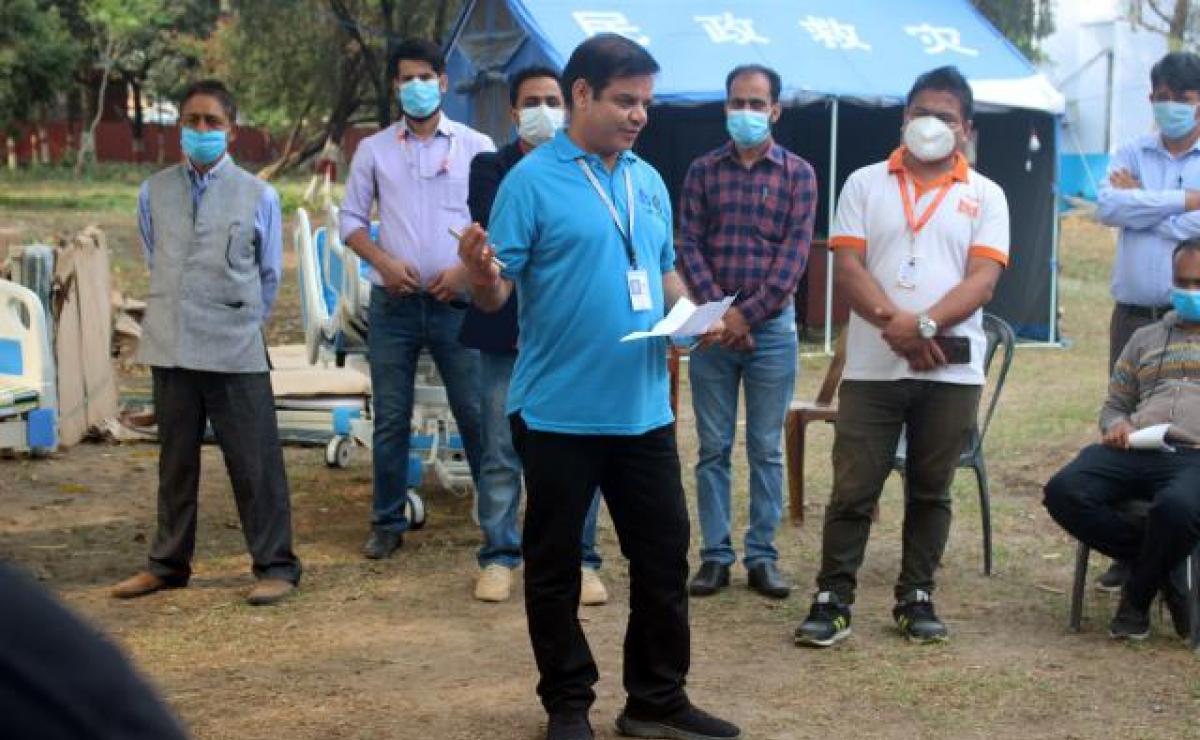Strengthen those who have been hit hardest

LWF calls for more livelihoods support during COVID-19
(LWI) - A choice between contracting a potentially fatal virus and having nothing to eat: The COVID-19 pandemic means many communities LWF serves are faced with impossible choices.
While governments worldwide are trying to stop the spread of infections with lockdowns and the closing of public spaces, aid workers voice concerns about the so-called secondary effects of the virus: The impact of preventive measures for many people might well outweigh the sanitary threat of the virus. The Lutheran World Federation (LWF) together with its partners has adapted the majority of its livelihoods projects to support vulnerable communities during the pandemic.
LWF Regional Program Coordinator and livelihoods adviser, Pablo LoMoro, fears that the pandemic might undo years of development support to help people move out of poverty. “COVID-19 is hampering livelihoods and pushing back a decade of economic gains for the most vulnerable”, he says. “Many of those we serve work as laborers. Social distancing and economic activity screeching to a halt means that many lose their means to make a living. They have no savings to fall back on.”
Secure the basics
LWF workshop on agroecology and soil management with women in Arauca, Colombia. Photo: LWF/ K. Lizzeth Banquero
In Latin America and the Caribbean, extremely strict lockdowns have left millions without jobs. The entire region is also fraught by social unrest and natural disasters. In Haiti, weak governance, civil unrest and a sudden volatility of the exchange rate have exacerbated the problem, says Michael French, LWF Regional Program coordinator for Latin America and the Caribbean.
Since May, Central America has been experiencing a particularly violent hurricane season. LWF through the local member churches supports people with food aid and relief goods.
On the other side of the globe, communities LWF works with in Nepal experience similar challenges. Cross-border workers employed in India, porters and loaders lost their jobs and returned to rural communities, sometimes even spreading the virus. Farmers cannot sell their products on markets.
In Burundi, Cameroon, Angola and East Africa, stricter border controls are slowing down trade, including vital imports of food and agricultural products or construction material for cash-for work-schemes. Communities have less access to markets, and deal with increased prices of everyday goods. In all these places, governments often cannot afford to provide enough for people to survive.
Back in the vicious cycle?
Livelihood support is aimed at helping people to provide for themselves; apart from training to produce items or services of value, it links to local markets to sell the product or service. The forced stop of the economy affects people in vulnerable situations and can undo years of building up a business.
“The loss of the possibility to market their vegetables and meats has demotivated the farmers to engage in the vegetable production, livestock raising and even the setting up of small shops which the program supported before for their income source”, says Yagya Gautam, LWF Project Manager in Nepal. “Vocational and skill-based training planned for the year have also halted for five months and are only now starting again. Those who were about to secure their livelihood through the program support will be again at risk of being impoverished.”
The LWF team in Nepal continued their livelihoods work, changing where possible to remote and mobile-based instructions. As the majority of LWF’s 9,200 field staff are community-based, they were often less affected by travel restrictions, and managed to continue some activities observing social distancing rules.
LWF staff Gautam Yagya briefs the local community about the LWF COVID-19 response during a handover of medical equipment at the hospital in Morang, Nepal. Photo: LWF Nepal
“The pandemic has undone the resilience of the refugees and vulnerable host communities,” says Philbert Habonimana, LWF Country Representative in Cameroon. “Their savings diminish as they try to counter the effects of the pandemic, while their earnings decline due to market restrictions.”
Everywhere, the LWF staff have observed negative coping mechanisms. “People in the cities are forced to go back to their villages where they may contribute to spreading the virus further,” Lo Moro says. “Our team is increasing seeing people skipping meals and eating less nutritious foods.” In Latin America, students start to drop out of university, trading their education to work low-paid jobs to provide for daily needs.
From long-term to emergency
In many places, what was meant to be a long-term development approach had to be adjusted to short-term relief work: LWF set up cash for work- schemes and cash grants to support people who have lost their source of income.
LWF hands over agricultural tools to farmers in Luau, Angola, at the start of the 2020/21 farming season. Photo: LWF Angola
In Iraq, LWF distributed food boxes in vulnerable IDP communities. In Nepal, LWF provided food aid and contracted locals to help spread awareness about COVID-19, or to support with small construction work. In Angola, and many other programs, LWF installed additional washing facilities at schools and other public places. In Latin America, LWF also handed out food aid to support people in need.
"People cannot stop going out to try and make a living. We have adjusted much of our programming – with the support of partners and donors – to helping families secure the basics in order to survive this crisis,” says Michael French, LWF Regional Program Coordinator for Latin America.
Besides food aid, LWF also distributed personal protective gear, soap and sanitizer. In many communities, it also fell to LWF to complement government information with awareness-raising campaigns on the dangers of COVID and the right way to protect oneself.
Kickstart local markets
People disinfect their hands before a distribution of relief goods in Burundi. Photo: LWF/ S. Chatterji
With all the difficulties they are facing, the communities LWF serves are resourceful in finding solutions. In the Zaatari and Kakuma refugee camps, sewing workshops were shifted from dressmaking to sewing face masks, which are then sold or given to the local population. The activity provides women with a steady income these days.
Vocational training funds in Cameroon were re-allocated for the production of face masks, giving graduates from previous years an opportunity to earn money while producing protective gear for refugees in the East, North and Adamaoua regions.
Still, more needs to be done to support those who have been hit hardest. LWF livelihoods focal point LoMoro calls for more cash-based interventions, to kick-start local markets and preserve people’s dignity. “Our focus is to maintain food production despite the difficulties, and to ensure value chain links,” LoMoro says in conclusion.
LWF/C.Kästner
LWF World Service is calling for donations, to meet the additional needs caused by the COVID-19 pandemic. Please support our work with the people who need it most.
Coronavirus and humanitarian aid: In a series of articles, LWF will show how the pandemic has impacted its humanitarian and development work worldwide, and what it means for the communities we serve.

